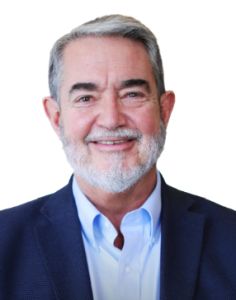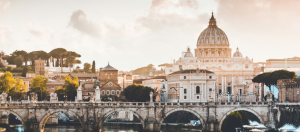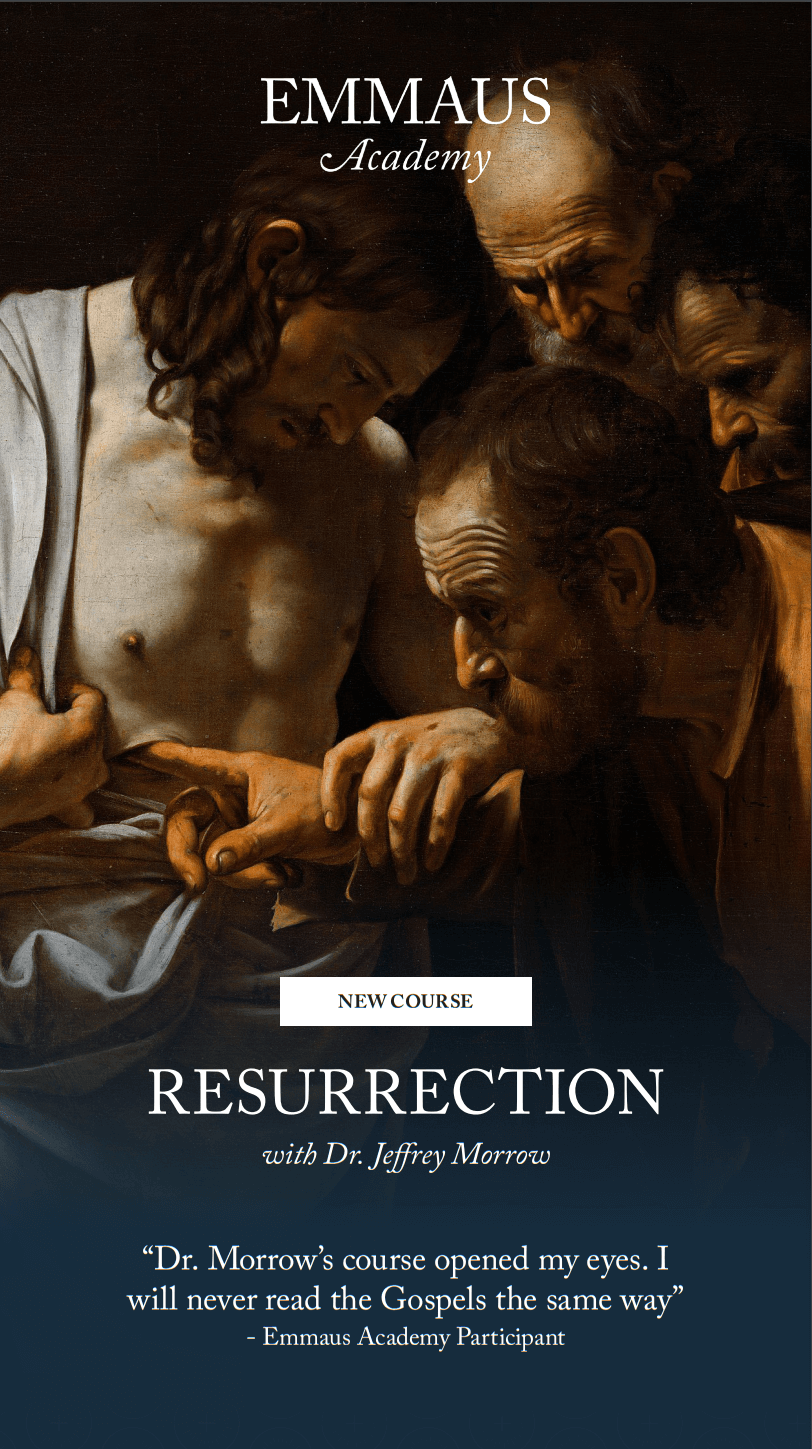
PILGRIMS LIKE PAUL
BY DR. SCOTT HAHN

way include Warsaw, Częstochowa, Kraków, Wadowice, Auschwitz, and Zakopane. In the Fall, Mike Aquilina, accompanied by historian Fr. Jihoon Kim, will guide pilgrims “In the Footsteps of the Church Fathers.” They’ll begin with several days in Rome and continue to Ostia Antica, Monte Cassino, Assisi, Ravenna, and Bologna. Along the way, pilgrims will encounter Clement, Ignatius, Polycarp, Origen, Hippolytus, Augustine, Jerome, Peter Chrysologus, Benedict, Gregory . . . the list could fill volumes. Next year, March 7–16, Rob Corzine will lead the “Shrines of Italy” pilgrimage, a tour ranging from the ancient (basilicas of Rome) to the modern (Padre Pio’s San Giovanni Rotondo). Pilgrims will also see the Holy House in Loreto and the sites of Eucharistic miracles. The itinerary winds down with a visit to peaceful Assisi and the places associated with the lives of Ss. Francis and Clare. Then, May 16–26, 2025, Dr. John Bergsma will travel land and sea in the “Footsteps of St. Paul.” Pilgrims will move by cruise ship to the ports of Greece and Turkey associated with the early spread of the Gospel. Stops include Philippi, Athens, Corinth, and Ephesus, and the beautiful islands of Mykonos, Crete, and Santorini. All pilgrimages include talks by the leaders—and plenty of time to get to know them. Find out more at StPaulCenter.com/pilgrimages. I do hope you’ll be able to join us. And I thank you for all you do to make these programs possible. Please keep praying for the mission we all share. 
The Vatican City at the Heart of Rome, Chris Czermak, Unsplash
MAY
5
ACTS 10:25–26, 34–35, 44–48
PS 98:1, 2–3, 3–4
1 JN 4:7–10
JN 15:9–17
6TH SUNDAY OF EASTER
BEGOTTEN BY LOVE
“God is love,” and He revealed that love in sending His only Son to be a sacrificial offering for our sins. In these words from today’s Epistle, we should hear an echo of the story of Abraham’s offering of Isaac at the dawn of salvation history. Because Abraham obeyed God’s command and did not withhold his only beloved son, God promised that Abraham’s descendants, the children of Israel, would be the source of blessing for all nations (see Genesis 22:16–18). We see that promise coming to fulfillment in today’s First Reading. God pours out His Spirit upon the Gentiles, the non-Israelites, as they listen to Peter’s preaching. Notice they receive the same gifts received by the devout Jews who heard Peter’s preaching at Pentecos —the Spirit comes to rest upon them and they speak in tongues, glorifying God (see Acts 2:5–11). In His love today, God reveals that His salvation embraces both the house of Israel and peoples of all nations. Not by circumcision or blood relation to Abraham but by faith in the Word of Christ, sealed in the Sacrament of Baptism, all peoples are to be made children of Abraham, heirs to God’s covenants of promise (see Galatians 3:7–9; Ephesians 2:12). This is the wondrous work of God that we sing of in today’s Psalm. It is the work of the Church, the good fruit for which Jesus chooses and appoints His Apostles in today’s Gospel. As Peter raises up Cornelius today, the Church continues to lift all eyes to Christ, the only one in whose name they can find salvation. In the Church, each of us has been begotten by the love of God. But the Scriptures today reveal that this divine gift brings with it a command and a duty. We are to love one another as we have been loved. We are to lay down our lives in giving ourselves to others, that they, too, might find friendship with Christ and new life through Him.
MAY
12
ACTS 1:1–11
PS 47:2–3, 6–7, 8–9
EPH 1:17–23
MK 16:15–20
ASCENSION OF THE LORD
MORE TO THE STORY
In today’s First Reading, St. Luke gives the surprising news that there is more of the story to be told. It did not end with the empty tomb or with Jesus’ appearances to the Apostles over the course of forty days. Jesus’ saving work will have a liturgical consummation. He is the great high priest, and He has still to ascend to the heavenly Jerusalem, there to celebrate the feast in the true Holy of Holies. Indeed, His intercession will lead to the Holy Spirit’s descent in fire upon the Church. Luke spells out that promise in the First Reading for the feast of the Ascension: “in a few days you will be baptized with the Holy Spirit” (Acts 1:5). The Ascension is the preliminary feast that directs the Church’s attention forward to Pentecost. On that day, salvation will be complete; for salvation is not simply expiation for sins (that would be wonder enough), but it is something even greater than that. Expiation is itself a necessary precondition of our adoption as God’s children. To live that divine life, we must receive the Holy Spirit. To receive the Holy Spirit, we must be purified through Baptism. The Epistle strikes a distinctively Paschal note. In the early Church, as today, Easter was the normal time for the baptism of adult converts. The sacrament was often called “illumination” or “enlightenment” (see, for example, Hebrews 10:32) because of the light that came with God’s saving grace. St. Paul, in his letter to the Ephesians, speaks in terms of glory that leads to greater glories still, as Ascension leads to Pentecost: “May the eyes of your hearts be enlightened,” he writes, as he looks to the divinization of the believers. Their “hope” is “his inheritance among the holy ones,” the saints who have been adopted into God’s family and now rule with him at the Father’s right hand. This is the “Good News” the Apostles are commissioned to spread—to the whole world, to all nations, beginning from Jerusalem—at the first Ascension. It’s the Good News we must spread today.
MAY
19
ACTS 2:1–11
PS 104:1, 24, 29–31, 34
1 COR 12:3B–7, 12–13
JN 20:19–23
PENTECOST SUNDAY
A NEW WIND
The giving of the Spirit to the new people of God crowns the mighty acts of the Father in salvation history. The Jewish feast of Pentecost called all devout Jews to Jerusalem to celebrate their birth as God’s chosen people in the covenant law given to Moses at Sinai (see Leviticus 23:15–21; Deuteronomy 16:9– 11). In today’s First Reading, the mysteries prefigured in that feast are fulfilled in the pouring out of the Spirit on Mary and the Apostles (see Acts 1:14). The Spirit seals the new law and new covenant brought by Jesus, written not on stone tablets but on the hearts of believers, as the prophets promised (see Jeremiah 31:31–34; 2 Corinthians 3:2–8; Romans 8:2). The Spirit is revealed as the life-giving breath of the Father, the Wisdom by which He made all things, as we sing in today’s Psalm. In the beginning, the Spirit came as a “mighty wind” sweeping over the face of the earth (see Genesis 1:2). In the new creation of Pentecost, the Spirit again comes as a “strong, driving wind” to renew the face of the earth. As God fashioned the first man out of dust and filled him with His Spirit (see Genesis 2:7), in today’s Gospel we see the New Adam become a life-giving Spirit, breathing new life into the Apostles (see 1 Corinthians 15:45, 47). Like a river of living water, for all ages He will pour out His Spirit on His Body, the Church, as we hear in today’s Epistle (see also John 7:37–39). We receive that Spirit in the sacraments, being made a “new creation” in Baptism (see 2 Corinthians 5:17; Galatians 6:15). Drinking of the one Spirit in the Eucharist (see 1 Corinthians 10:4), we are the firstfruits of a new humanity—fashioned from out of every nation under heaven, with no distinctions of wealth or language or race, a people born of the Spirit.
MAY
26
DT 4:32–34, 39–40
PS 33:4–5, 6, 9, 18–19, 20, 22
ROM 8:14–17
MT 28:16–20
SOLEMNITY OF THE HOLY TRINITY
FAMILY OF LOVE
Last Sunday, we celebrated the sending of the Spirit, which sealed God’s new covenant and made a new creation. In this new creation, we live in the family of God, who has revealed Himself as a Trinity of love. We share in His divine nature through His Body and Blood (see 2 Peter 1:4). This is the meaning of the three feasts that cap the Easter season: Pentecost, Trinity Sunday, and Corpus Christi. These feasts should be intimate reminders of how deeply God loves us, how He chose us from before the foundation of the world to be His children (see Ephesians 1:4–5). Today’s readings illuminate how all God’s words and works were meant to prepare for the revelation of the Trinity and God’s blessing in Jesus Christ—the blessing we inherited in Baptism and renew in each Eucharist. By God’s Word the heavens and earth were filled with His kindness, we sing in today’s Psalm. Out of love, God called Abraham and chose his descendants to be His own people, Moses says in today’s First Reading (see Deuteronomy 4:20, 37). Through the Israelites, God revealed to the nations that He alone is Lord, and there is no other. In Jesus, God’s Word took flesh as a son of Abraham (see Matthew 1:1). And Jesus reveals in the Gospel today that the one God is Father, Son, and Spirit, and that He desires to make all peoples His own. As He led Israel out of Egypt, God freed us from slavery, Paul says in today’s Epistle. As He adopted Israel (see Romans 9:4), He gives us the Spirit by which we can know Him as our Father. As God’s heirs, we receive the commissions of both Moses and Jesus today. We are to fix our hearts on Christ and to observe all that He has commanded. The Eucharist is His pledge that He will be with us until the end, that He will deliver us from death to live forever in the promised land of His kingdom.
Visit My.StPaulCenter.com to watch
ST. PAUL CENTER PILGRIMAGES
GO WHERE THE
SAINTS LIVED
POLAND
Land of
Saints
Scott & Kimberly Hahn
August 12–20, 2024
ITALY
Footsteps of the Church Fathers
Mike Aquilina
October 10–20, 2024
ITALY
Shrines of
Italy
Rob Corzine
March 7–16, 2025
GREECE
Footsteps of
St. Paul
John Bergsma
May 16–26, 2025
SPAIN + PORTUGAL
Marian
Shrines
Fr. Daniel Maria Klimek
June 10–19, 2025
Embark on the spiritual journey of a lifetime when you join a St. Paul Center Pilgrimage. Experience rich
history and deep faith walking in the footsteps of saints and martyrs. Grow in your faith, deepen your love
for Christ, and create lifelong memories with fellow pilgrims.
Dr. Scott Hahn Pilgrimages








